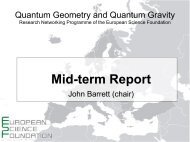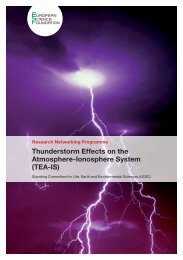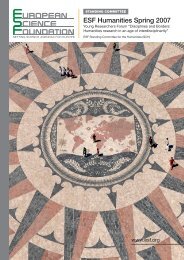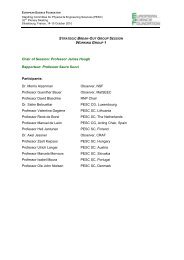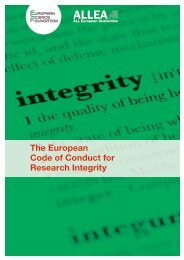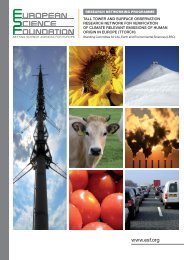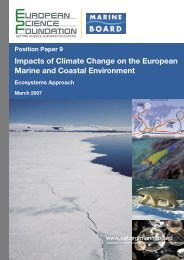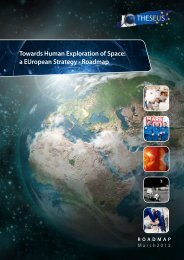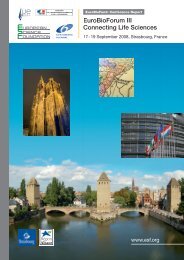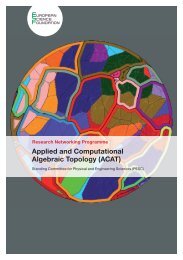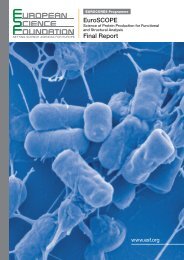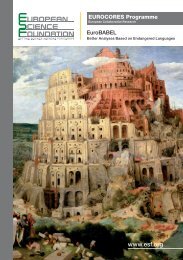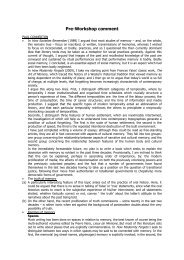Synthesis Report - European Science Foundation
Synthesis Report - European Science Foundation
Synthesis Report - European Science Foundation
You also want an ePaper? Increase the reach of your titles
YUMPU automatically turns print PDFs into web optimized ePapers that Google loves.
Annex 5. GlossaryThe combination involves finding a common language, newmethods and questions. It allows the exchange of concepts,rules, methods and tools among different disciplines in orderto achieve a global understanding of a common theme.In contrast, multidisciplinary research or education alsoinvolves two or more disciplines or fields of study around acommon study theme and that examine simultaneously theirrespective objects but there is no attempt to find commonground between them or to share specific rules, methods andtools, while they combine their conclusions. [See Annex 3]KnowledgeKnowledge refers to the way people understand the world,the way in which they interpret and apply meaning to theirexperiences. It relates to facts, information and skills acquiredthrough experience or education, involving rejection,creation, selection, development and transformation of informationemerging from complex and ongoing processes.Knowledge is inextricably linked to a social, environmentaland institutional context.Scientific knowledge: knowledge that has been legitimisedand validated by a formalised process of data gathering, analysisand documentation and through peer review.Explicit knowledge: knowledge that has been or can bearticulated, codified, and stored and exchanged. The mostcommon forms of explicit knowledge are manuals, documents,procedures, cultural artefacts and stories. Works ofart can be seen as other forms of explicit knowledge wherehuman skills, motives and knowledge are externalised.Empirical knowledge: knowledge derived from and constitutedsolely within a restricted personal or cultural environment.Modern communication and information technologies,and scientific instrumentation, can extend the ‘empiricalenvironment’ in which empirical knowledge is generated.Local or indigenous knowledge: knowledge that is constitutedand validated in a given environment, culture or society,developed within a local connection to the environment.Traditional knowledge: Cumulative body of knowledge,practices and beliefs, evolving by adaptive processes andhanded down by cultural, intergenerational transmission. Itmay not be indigenous or local, but it is distinguished by theway in which it is acquired and used, through the social processof learning and sharing knowledge.Knowledge systemA knowledge system is defined as a network of actors connectedby social relationships, formal or informal, that dynamicallycombine knowing, doing and learning to bringabout specific actions for sustainable development (vanKerkhoff and Szlezák, 2010).LearningLearning is the acquisition of knowledge or skills throughstudy, experience or being taught.‘Social (or collaborative) learning’ refers to learning processesamong a group of people who seek to improve a commonsituation and take action collectively. See, for example, www.ecologyandsociety.org/vol15/iss4/resp1.‘Sustainability learning’ relates to learning to develop thecapacity to manage options for the adaptation of human societiesto the limits and changing conditions that are imposedby their own social-ecological systems. See, for example,www.ecologyandsociety.org/vol12/iss2/art3.Open knowledge systemIn an open knowledge system, knowledge is generated frommultiple sources (some of which are scientific and evidencedbased)and shared at every stage of its development. Problemsand solutions are defined by society as a whole, not just byresearchers. An open knowledge system requires collectiveproblem framing, societal agenda-setting and a correspondinginstitutional framework, extended peer review, broaderand more complex but transparent metrics for research evaluation,better treatment of uncertainty and values, proceduresto ensure that knowledge is ‘placed in context’, greater flexibilityof research funding, cooperation of public and privateorganisations and stakeholder engagement. New media andnew forms of public participation, combined with expandedaccess to information, will be crucial in building such an openknowledge system.Reflexive processBeing reflexive requires that parties examine their prioritiesbefore they react. It is linked to the recognition that anyframing of a system is partly constituted by the observer’sperspectives and intended (re)actions. This involves asking“Why this situation is so important to me? Why do I care somuch?” “What have I done to contribute to the problem?”and “What might be done in order to contribute to its resolution”(Rothman, 1997, p.37). The answers to these questionscan be used to determine the priorities of participants, andhelp in the communication and resolution process.ResilienceResilience is the long-term capacity of a system to deal withchange. It is either the amount of structural or functionalchange or disturbance that a system can undergo throughshort-term episodic shocks or perturbations without changingstate or its essential functions; or the long-term ability of asystem to recover from, to continue to develop, or to resist beingaffected by such change. It reflects the capacity of a systemto stay or return in its original steady state. This definition emphasisesconditions where instabilities can flip a system intoanother regime of behaviour, i.e., to another stability domain.It is also connected to knowledge-building and the building oflearning capabilities in institutions and organisations.Social-ecological systemAn integrated system of people and nature with reciprocalfeedback and interdependence. The concept emphasises thehumans-in-nature perspective and that delineation betweenthe social and ecological is artificial and arbitrary.SustainabilitySustainability refers to the capacity of the social-ecologicalsystem (see definition above) to be maintained at a certainrate or level. Overall, the term refers to the ability to maintainhuman well-being, social equity and environmental qualityover indefinite periods of time, i.e., ensuring that future generationswill have coupled human-environment systems capableof providing goods and services for the long run, withoutdegradation in structure or function.51Responses to Environmental and Societal Challenges for our Unstable Earth (RESCUE)



